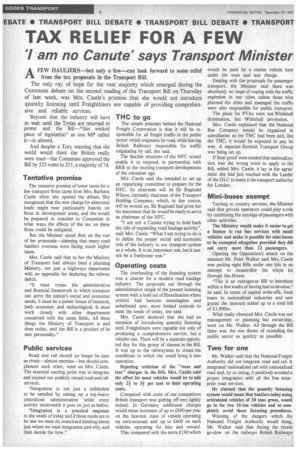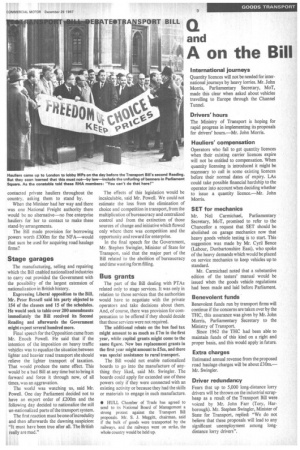TAX RELIEF FOR A FEW
Page 10

Page 11

If you've noticed an error in this article please click here to report it so we can fix it.
`I am no Canute' says Transport Minister
AFEW HAULIERS—hut only a 'few—can look forward to some relief from the tax proposals in the Transport Bill.
The only ray of hope for the vast majority which emerged during the Commons debate on the second reading of the Transport Bill on Thursday of last week, was Mrs. Castle's promise that she would not introduce quantity licensing until Freightliners are capable of providing comprehensive and reliable services.
Beyond that the industry will have THC to go to wait until the Tories are returned to power and the Bill—"this wicked piece of legislation" as one MP called it—is altered.
And despite a Tory warning that the world would think the British really were mad—the Commons approved the Bill by 325 votes to 251, a majority of 74.
Tentative promise
• The tentative promise of lower taxes for a few transport firms came from Mrs. Barbara Castle when she opened the debate. She recognized that the new charge for abnormal loads might bear particularly heavily on firms in development areas, and she would be prepared to consider in Committee in what . ways the effects of the tax on these firms could be mitigated.
But the Minister stood firm on the rest of her proposals------claiming that many road hauliers overseas were facing much higher taxes.
Mrs. Castle said that to her the Ministry of Transport had always been a planning Ministry, not just a highways department with an appendix for deploring the railway deficit.
"It must create the administrative and financial framework in which transport can serve the nation's social and economic needs; it must be a power house of research, both economic and technological. It must work closely with other departments concerned with the same fields. All these things the Ministry of Transport is and does today, and the Bill is a product of its new personality."
Public services
Road and rail should no longer be seen as rivals—almost enemies—but should complement each other, went on Mrs. Castle. The essential starting point was to integrate and expand our publicly owned road and rail services.
"Integration is not just a shibboleth to be satisfied by setting up a top-heavy centralized administration while every activity underneath it goes on just as before.
"Integration is a practical response to the needs of today and if those needs are to be met we must do some hard thinking about just where we want integration and why, and then decide the how."
The simple principle behind the National Freight Corporation is that it will be responsible for all freight traffic in the public sector which originates byroad, while leaving British Railways responsible for traffic originating by rail, she said.
The flexible structure of the NFC would enable it to respond, in partnership with BRB to the exciting transport developments of the container age.
Mrs. Castle said she intended to set up an organizing committee to prepare for the NFC. Its chairman will be Sir Reginald Wilson, currently chairman of the Transport Holding Company, which, in due course, will be wound up. Sir Reginald had given her his assurance that he would be ready to serve as chairman of the NFC.
"I am not a Canute trying to hold back the tide of expanding road haulage activity", said Mrs. Castle. "What I am trying to do is to define the proper social and economic role of the industry in our transport system as a whole. It is an important role, but it cannot be a freebooter one."
Operating costs
The overhauling of the licensing system was a charter for a modern road haulage industry. The proposals cut through the administrative tangle of the present licensing system with a bold act of liberalization where control had become meaningless and substituted new, more limited controls to meet the needs of today, she said.
Mrs. Castle declared that she had no intention of introducing quantity licensing until Freightliners were capable not only of producing a comprehensive service, but a reliable one. There will be a separate appointed day for this group of clauses in the Bill. It was up to the railwaymen to create the conditions in which she could bring it into operation.
Rejecting criticism of the "wear and tear" charges in the Bill, Mrs. Castle said the effect for most vehicles would be to add only 21to 31 per cent to their operating costs.
Compared with some of our competitors British transport was getting off very lightly indeed. In Germany additional charges would mean increases of up to £800 per year on the heaviest class of vehicle operating on own-account and up to £600 on such vehicles operating for hire and reward.
This compared with the extra £190 which would be paid by a similar vehicle here under the wear and tear charge.
Dealing with the proposals for passenger transport, the Minister said there was absolutely no hope of coping with the traffic explosion in our cities unless those who planned the cities and managed the traffic were also responsible for public transport.
The plans for PTAs were not Whitehall domination, but Whitehall devolution.
Mrs. Castle explained that the National Bus Company would be organized in subsidiaries as the THC had been and, like the THC, it would be expected to pay its way. A separate Scottish Transport Group was being set up.
If final proof were needed that nationalization was the wrong word to apply to the Bill, added Mrs. Castle, it lay in the agreement she had just reached with the Leader of the GLC to make it the transport authority for London.
Mini-buses exempt
Turning to country services, the Minister said that private operators could play a role by combining the carriage of passengers with other activities.
The Ministry would make it easier to get a licence to run bus services with small vehicles and make it possible for mini-buses to be exempted altogether provided they did not carry more than 12 passengers.
Opening the Opposition's attack on the measure Mr. Peter Walker said Mrs. Castle was putting eight Bills under one title in an attempt to steamroller the whole lot through the .House.
"This is an outrageous Bill to introduce within a few weeks of having had to devalue," he said. In terms of capital write-offs, fresh loans to nationalized industries and new grants the measure added up to a total bill of £1,900m.
What really obsessed Mrs. Castle was not management or planning but ownership, went on Mr. Walker. All through the Bill there was the one theme of extending the public sector as quickly as possible.
Two for one
Mr. Walker said that the National Freight Authority did not integrate road and rail. It integrated nationalized rail with nationalized road and, by so doing, it positively avoided a proper integration with all the free enterprise road services.
He claimed that the quantity licensing system would mean that hauliers today using articulated vehicles of 30 tons gross, would go in for two 16-ton vehicles and so completely avoid these licensing procedures.
Warning of the dangers which the National Freight Authority would bring, Mr. Walker said that during the recent go-slow on the railways British Railways contacted private hauliers throughout the country, asking them to stand by.
When the Minister had her way and there was one National Freight authority there would be no alternative—no free enterprise hauliers for her to contact to make these stand-by arrangements.
The Bill made provision for borrowing powers worth £300m for the NFA—would that sum be used for acquiring road haulage firms?
Stage garages
The manufacturing, selling and repairing which the Bill enabled nationalized industries to carry out provided the Government with the possibility of the largest extension of nationalization in British history.
Expressing Liberal opposition to the Bill, Mr. Peter BesseII said his party objected to 154 of the clauses and 15 of the schedules. He would seek to table over 200 amendments immediately the Bill received its Second Reading and afterwards the Government might expect several hundred more.
Final speech for the Opposition came from Mr. Enoch Powell. He said that if the intention of the imposition on heavy traffic vehieles was to equalize the situation,between lighter and heavier road transport she should relieve the lighter transport of taxation. That would produce the same effect. This would be a bad Bill at any time but to bring it forward and force it through now, of all times, was an aggravation.
The world was watching us, said Mr. Powell. One day Parliament decided not to have an export order of £200m and the following day decided to nationalize the still un-nationalized parts of the transport system.
The first reaction must be one of incredulity and then afterwards the dawning suspicion: "It must have been true after all. The British really are mad." The effects of this legislation would be incalculable, said Mr. Powell. We could not estimate the loss from the elimination of choice and competition in transport, from the multiplication of bureaucracy and centralized control and from the extinction of those sources of change and initiative which flowed only where there was competition and the opportunity and reward for enterprise.
In the final speech for the Government, Mr. Stephen Swingler, Minister of State for Transport, said that the major part of the Bill related to the abolition of bureaucracy and time wasting form filling.
Bus grants
The part of the Bill dealing with PTAs related only to stage services. It was only in relation to those services that the authorities would have to negotiate with the private operators and take decisions about them. And, of course, there was provision for compensation to be offered if they should decide that those services were not required.
The additional rebate on the bus fuel tax might amount to as much as £.7m in the first year, while capital grants might come to the same figure. New bus replacement grants in the first year might amount to £5m, and there was special assistance to rural transport.
The Bill would not enable nationalized boards to go into the manufacture of anything they liked, said Mr. Swingler. The boards could apply for extended use of these powers only if they were connected with an existing activity or because they had the skills or materials to engage in such manufacture.
• HULL Chamber of Trade has agreed to send to its National Board of Management a strong protest against the Transport Bill proposals. Mr. S. J. Meggitt, chairman, said if the bulk of goods were transported by the railways, and the railways went on strike, the whole country would be held up.












































































